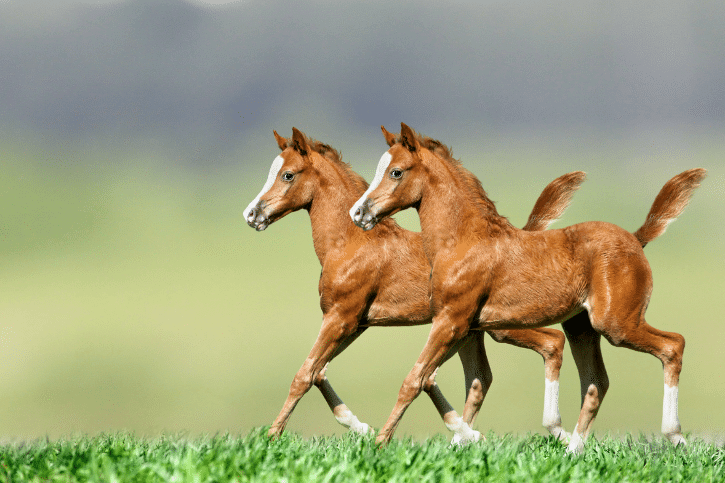Can Horses Have Twins?
Our horse recently gave birth, and my son loves horses so much that he was hoping we might get twins.
I wasn’t even sure if this was possible, and I’ve been raising horses for half my life.
In the end, the mare only gave birth to a single foal, and though my son was a little disappointed, we were all still happy to welcome the new member of our family.
Once the excitement had died down and the mare was happily raising her new foal, I decided to head back and do some research about whether horses can have twins.
So, can horses have twins?
It is possible, though exceedingly rare. Conceiving twins is, itself, incredibly rare; carrying them to term is more uncommon still; birthing healthy twin foals is, for all intents and purposes, virtually unheard of. For practical purposes, horses really cannot have twins.
Though many quadrupedal animals give birth to litters—dogs, cats, etc.—bigger animals like horses struggle to bring more than a single foal to term.
Carrying the fetus is an incredible burden for the mother even when it is only one, so carrying a set of twins healthily is virtually impossible.
Let’s look further into this question.
What are the odds of a horse having twins?
To conceive the twins in the first place, the odds are about 1 in 10,000.
Given the amount of breeding horses in the world, you’d probably expect that meant we saw a lot more of these twin horse pregnancies.
However, as I’ve said, carrying twins to term is likely either to result in the death of both fetuses or even the mother as well.
When breeders successfully impregnate a horse, regular check ups on the baby are essential.
At day 26 of gestation, an ultrasound is typically done.
If twins are found, they are aborted in almost all cases.
This protects the mother from potential harm.
This is why, then, despite only 10,000 to 1 odds, twin horse births are virtually unheard of.
Even if twins are conceived, the odds of actually carrying it to term and birthing healthy foals are more or less in the millions.
It simply doesn’t happen most of the time.
It is in the interests of everyone to avoid twin pregnancies and keep the mother horse happy and healthy to try again.
Can a horse have triplets?
Given the answer to the question about twins, I’m sure you can guess where this is going.
Again, in principle, it’s entirely possible for a mare to conceive triplets.
It’s incredibly unlikely; orders of magnitude lower odds of this happening than of twins at 10,000 to 1.
If a horse did conceive triplets, it is simply unimaginable that she would be able to successfully carry them to term and birth them.
One, two or all of the foals would likely die before reaching term, and if the pregnancy was allowed to go on for long enough, it would likely kill the mother as well.
So, for all practical purposes, no, horses cannot have triplets.
Can twin foals survive?
In principle, yes, it is possible, and there is at least one documented case.
In fact, one mare named Destiny, living in Exeter in the U.K., gave birth to not one but two sets of identical twins who grew up healthy and happy.
As the breeder would tell you, though, the odds of this are simply astronomical.
As I said, the chances of carrying one set of twins to term is likely in the millions; a second set is simply miraculous.
Aside from Destiny, the answer is mostly no.
Twin foals create a multitude of potential problems for the mother and the fetuses, which almost always results in death if they are carried to term.
So, though it can happen to defy the odds, for the most part, it is exceedingly rare.
Can a horse have twins days apart?
Typically, a horse’s labor should be over fairly quickly.
Certainly, if she is giving birth to a single foal, it will not take a particularly long time.
At least, compared with how long human labor can sometimes take.
However, complications caused by twin fetuses could mean that your mare gives birth to the foals on separate days.
It is very unlikely, and if this does happen, the likelihood is that the horse is in pain or distress, and that one or both of the foals will be dead at birth.
Again, in theory possible, in practice it likely indicates an issue.
Though it is, in principle, possible, practically, it is virtually impossible for a mare to have healthy twin foals.
Carrying an extra baby puts everyone at risk; both fetuses and the mother.
It’s easy to understand why; new-born foals are simply too big.
Carrying two to term and successfully giving birth to them just isn’t really possible for any ordinary horse.
In principle, it’s possible; in practical terms, it never happens, and documented cases are not forthcoming.
